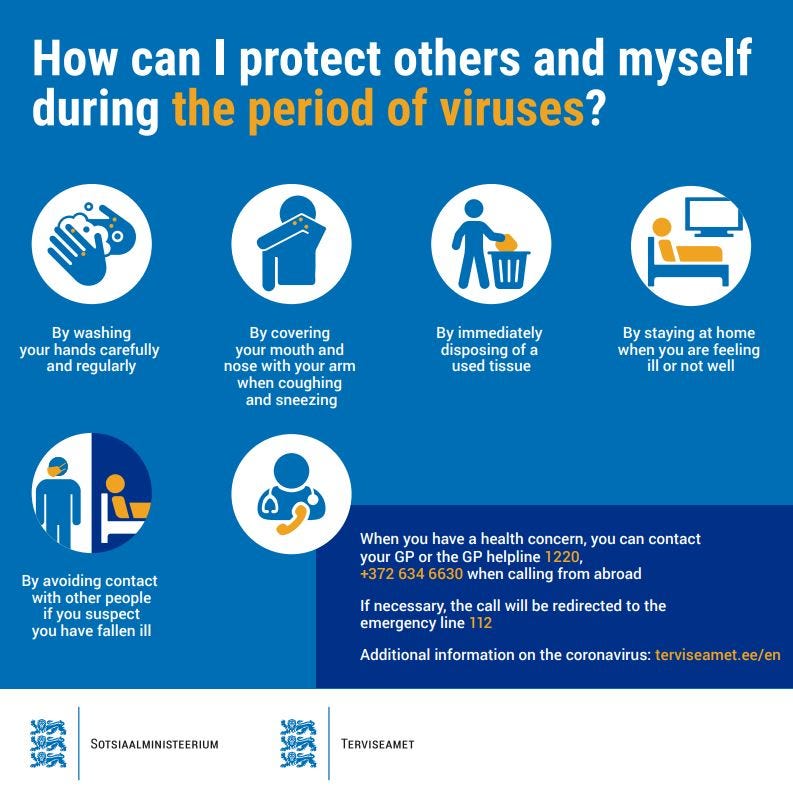e-residency update #3 on the coronavirus (covid-19) pandemic
Resources for e-residents staying at home and working remotely
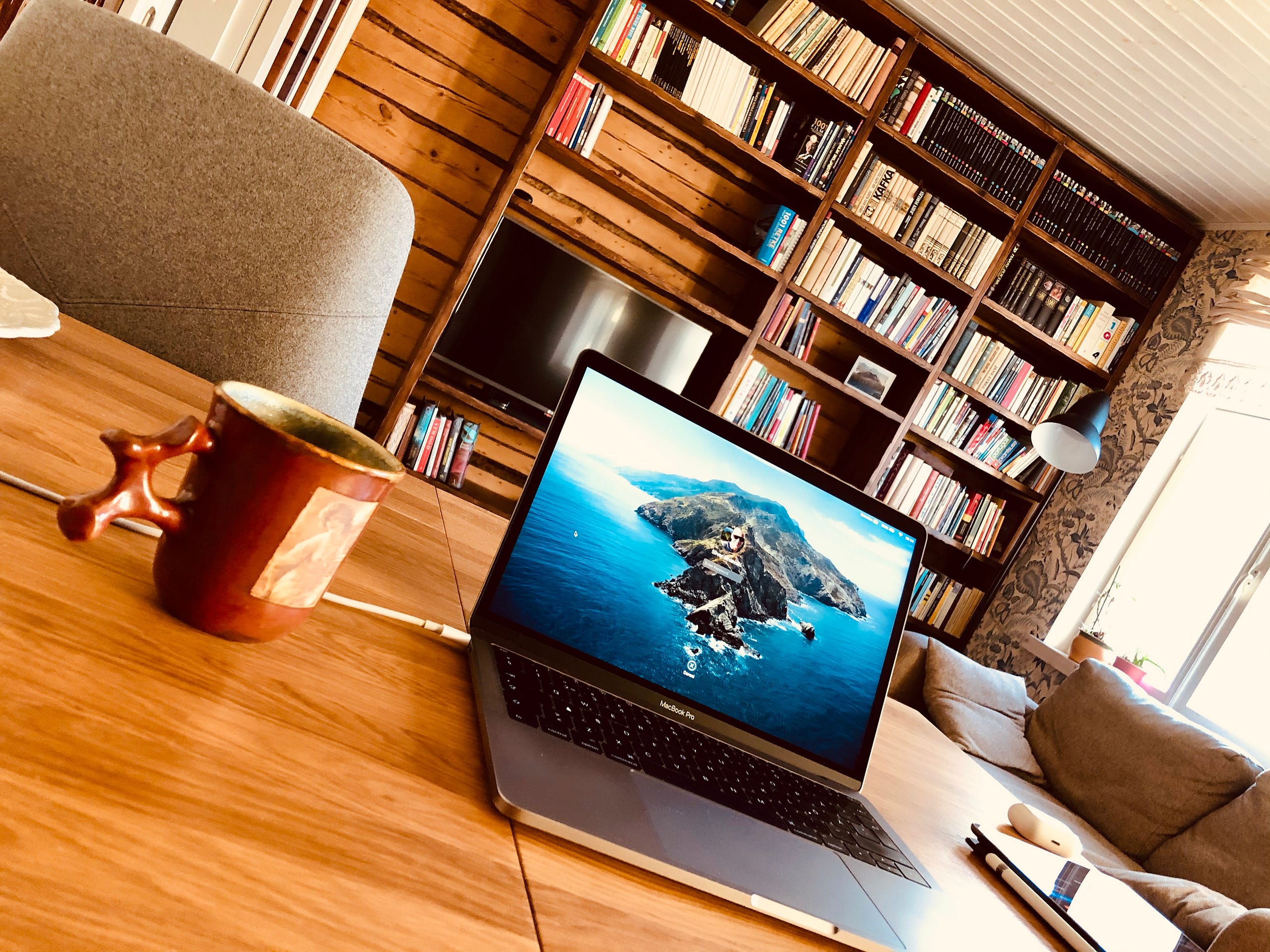
The coronavirus (COVID-19) crisis has created a number of challenges for entrepreneurs, from structural to strategic, and from financial to personal. As e-Residency Managing Director Ott Vatter said in his open letter last week, the e-Residency team is here to empower our community of e-resident entrepreneurs and other stakeholders through this crisis as much as we can.
One way we hope to do this is by sharing our knowledge and experience, as well as pointing out potentially useful resources to support you and your businesses through the pandemic. As well as the FAQs page on our website, we are holding webinars, providing timely updates on social media, and of course posting articles on this blog.
This post aims to provide some guidance and resources to e-residents and others, who are trying to adapt to the current state of affairs, where staying and working from home are the new normal, travel is restricted, classes, conferences, and events are moving online, and the business world faces uncertain times.
Stay tuned for next week’s update, which will focus more on how to remain resilient as an entrepreneur and keep your business going during the crisis.
Stay home
Since the outbreak, government and social-led policies are requiring many of us around the world to stay at home and practice “social distancing” to limit infections of the virus and protect overstretched health institutions. Countries have adopted different measures to implement social distancing practices among their communities, from banning public gatherings to imposing curfews.
This week, the Government of Estonia announced strict new measures. From this Friday, people must be over two metres apart from others in public places and can only move around in public on their own or with one other person (with the exception of families). In an interview on Estonian television, President Kaljulaid also strongly encouraged people here to limit their movements in public as much as possible except where absolutely necessary. Here, in Tallinn where I live, the streets are very quiet as more and more people stay home if they can.
Stay up to date with the coronavirus situation in Estonia at the Estonian Health Board webpage, which is updated daily with statistics, guidance, and useful links. You can also follow the Estonian World blog and ERR News for the latest updates.
Work from home
As a result of staying at home, scores of people around the world with the ability to do so have had to switch to the home office. From small businesses to multinational corporations, and from interns to founders, many people around the world are discovering the joys and challenges of remote work.
For many e-residents, remote work is probably nothing new. As digital nomads, freelancers, solopreneurs, and small business owners running location independent enterprises, I guess that for a lot of you “working from home” is business as usual (when you’re not working from the road.) In which case, please share your own tips for remote working in the comments below!
For the rest of us though, this crisis has truly transformed the way we as a society will organise our work now and in the future.
At home with e-Residency
The e-Residency team is no different. We all started working from home as soon as the Estonian Government announced a national Emergency Situation two weeks ago, at the same time as schools, universities, and cultural institutions around the country closed and public gatherings prohibited.
Thanks to Estonia’s well-developed digital infrastructure and the fact that remote work and entrepreneurship are in the very DNA of e-Residency, our team is privileged to have the right hardware, software, and virtual tools to continue working productively even in these challenging times. Last week I was quickly set up with a monitor, mouse, and keyboard for my home office by my employer. It might seem a simple thing, but as someone with weak eyesight and in a role which involves a lot of writing, reading, and research work, it instantly increased my work productivity from one day to the next.
But it’s not just equipment that requires adaptation. Behaviour is also something to consider, both individually and collectively. As a team, we have already put in place strategies to ensure we each stay focused and motivated. Routine, working intentionally, and communication are key to tailor our individual and group behaviours to suit the new circumstances.
E-Residency Product Manager Pille Siidra explains:
“To me, some level of routine is quite important for productive work — for example, starting around the same time every day; intentionally sequencing my work by doing my more routine stuff like checking emails first and leaving the big stuff for the times when I know I’m most productive. I have discovered that to keep myself on track, it is very helpful to be in close contact with my colleagues, so even a random check-in for a chat or brainstorm helps me keep my work-mode on. It not only helps keep me on track but more importantly, it keeps me sane.”
For similar reasons, the sub-teams within e-Residency have each upped their facetime to include a short stand-up call each morning to start the day on the same page. We’ve also diarised one-on-one meetings within sub-teams to ensure individual team members feel supported and heard. Our wider team uses Slack to communicate in different channels to save from having too many calls or meetings. This is mostly work-related but also involves some sharing of various lighter materials to help keep us sane, from funny memes to inspiring stories, photos of our home office experiences, and even links to free online exercise classes and other cool content.
And it’s not just the communication tools and strategies that have needed adjusting, but also HOW we communicate. As e-Residency Marketing Manager Alex Wellman puts it:
“Working remotely requires us to be more intentional in our communications, especially when using asynchronous tools like Slack. Instead of writi
ng “Hi!” and waiting for a response, write all of the questions you have, with the understanding that it might not be read for a few hours.”
Working in your home during a global crisis will also inevitably affect both your productivity and/or your work-life balance, depending on the type of worker you are and the distractions in your environment. The distractions not only include the never-ending news cycle and social media updates about the crisis but things closer to home, like family members, flatmates, food, and furry friends.
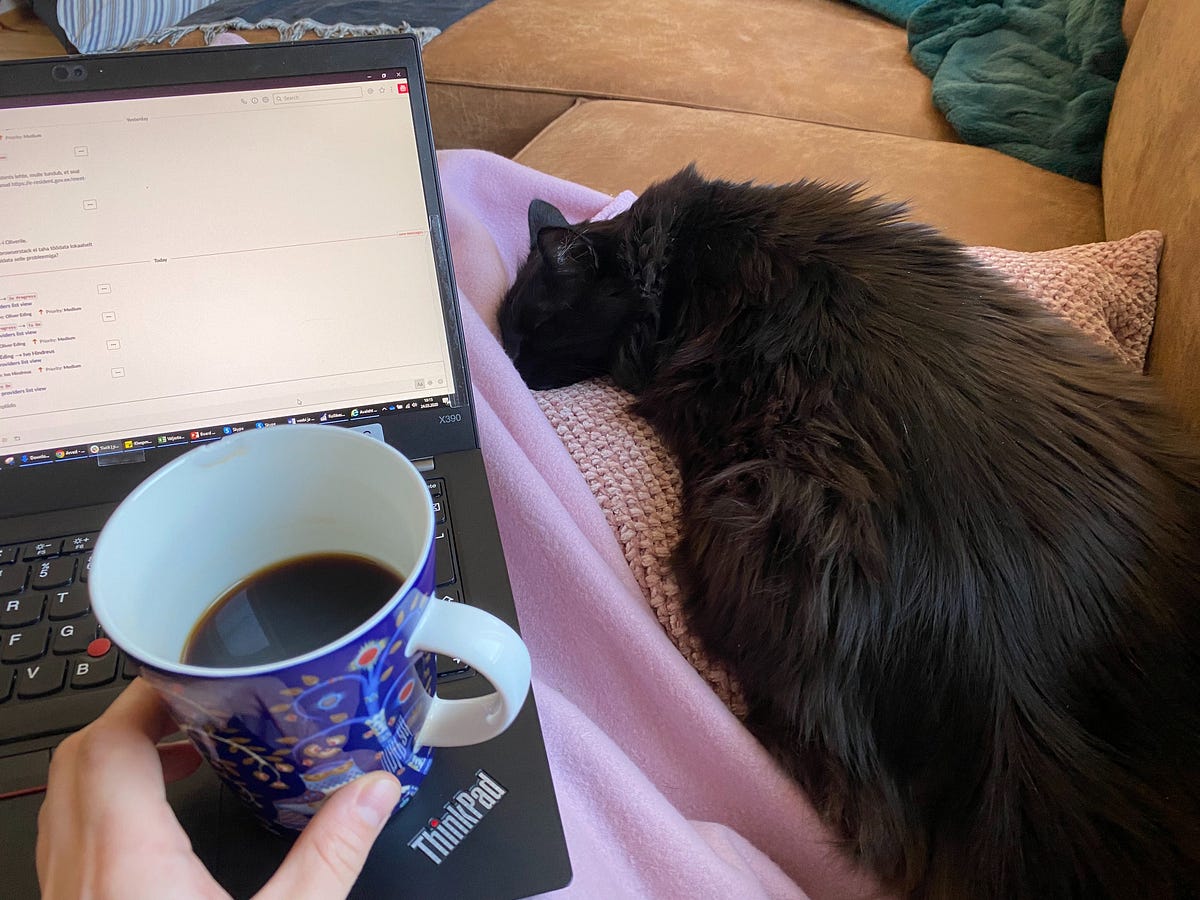
As someone who lives alone and is currently self-isolating, I find it difficult to ‘leave’ work at the end of the day. I find that until I have intentionally switched off my equipment and done something unrelated to work, I am still drawn back to my emails, Slack messages, or writing tasks long into the evening.
To overcome a similar problem, Ott uses Estonian time management solution Toggl to keep him on track during his work day:
“It’s easy to get caught up in work when doing it from home. Work never seems to run out and it’s important to maintain work life balance. I use Toggl to help me keep track of time spent, it also gives me a great overview as to which tasks I might struggle and need to plan more time for.”
For more resources to help you work remotely, check out these other Estonian companies supporting digital solutions for online businesses and remote entrepreneurship.
Working with children at home
From the extreme worry of cybersecurity to another worry that is closer to home, is adapting to working with the littlest of distractions — kids! While many of us have worked from home in the past, we’re now adapting to a more extreme state of affairs — where our children are home schooling alongside us.
Liina Kadari, e-Residency Business Development Manager sees a silver lining in the challenge of working from home with her 7 year old son:
“It certainly hasn’t let my negotiation skills rust! Although the outcome might be minimal, my professional skills continue to develop.”
So you never know, maybe your children will teach you a new skill!
Your own professional development aside, another potentially useful resource for those in the same boat might be some of the free digital education tools made public by Estonia’s Ministry of Education to support other countries during the crisis. The tools suit all ages of children from preschool to high school and include a number of creative solutions for digital learning and development.
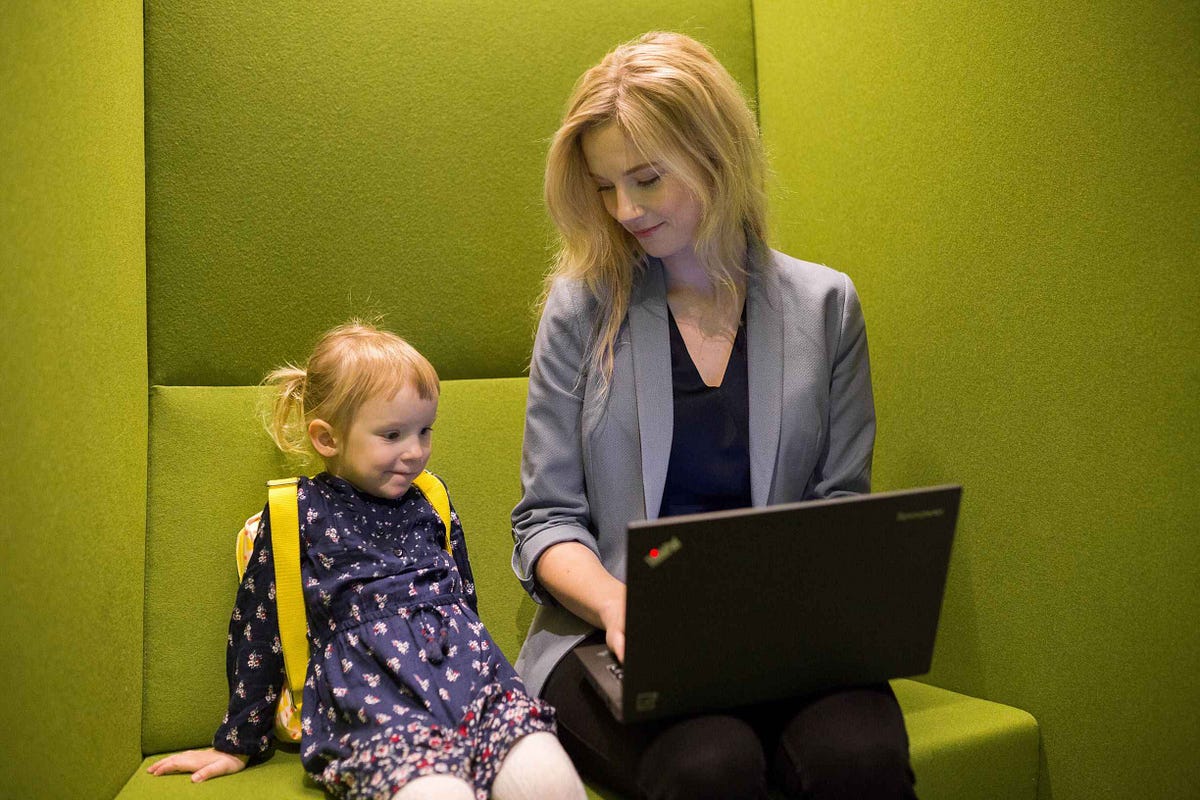
Hack the crisis from home
Accelerate Estonia and Garage 48 co-hosted a hackathon a few weeks ago (which they impressively organised in less than a day!) to respond to the coronavirus crisis. Called Hack the Crisis, over 1000 people participated from 30 countries and together hacked 30 solutions.
Inspired by this initiative, there are many more events going on in the world right now. If you have time and useful skills, join the Hack the Crisis Global Community and find out how to organise, support,or participate in your own hack! E-Residency will also have more news on this topic in the coming days, so keep an eye out for this news on our social media!
One of the prototypes developed during Hack the Crisis has now been taken over by the Estonian Government. It’s a chatbot called SUVE and is designed to give quick and helpful information on coronavirus and the emergency situation in Estonia. You can already find it popping up on Estonian Government websites.
Another prototype developed during the hackathon is the Hub for coronavirus related volunteering powered by Zelos. The hardships of the most vulnerable people in Estonian society, e.g. those who don’t have any family members or friends to help them, have been gravely exacerbated by the coronavirus crisis. There are many people who would be willing to help, but currently, there is no good way to connect people in need with volunteers. The hub aims to fill this gap and connect people at risk here in Estonia with volunteers.
And finally, Share Force One was also developed during Hack the Crisis. It’s a workforce sharing platform that connects B2B sides for temporary workforce exchange. Share Force One works in partnership with Estonian Unemployment Insurance Fund. It matches employers who can lend out their workers to businesses who need them.
Staying healthy at home
Last but certainly not least, now that we are all at home it’s important to do things for our body, mind and soul.
Whatever is your preferred mode to stay active and mentally strong, whether it be playing an instrument, cooking, watching films, sleeping, or socialising (virtually of course!), we all need to take a break and look after ourselves in the best way we know how.
My colleague, Ott recommends taking regular breaks and of course getting fresh air:
“Make sure to get fresh air, which should come as no surprise but the best ideas usually come when you fill your brain with oxygen.”
Unfortunately, I can’t really go outside too much at the moment as I am self-quarantining, and if you’re in the same boat, I do recommend investing in a good air purifying machine. It’s amazing the difference in focus and concentration I have when I switch mine on.
Other colleagues are using their time at home to catch up on unheard podcasts or unread books, or instil in themselves new healthy habits to take forward even after the crisis is over. Like Raimo, who aside from listening to the Visit Jamaica Spotify playlist to inspire brighter days and dreams of future travel, advises:
“Make time for “lighter stuff” for relaxing. I personally also have now listened to some podcast/radio talks (in Estonian) that I had bookmarked for myself some time ago as well as reading books (to get away from screens).”
Social Media and Email Marketing Manager, Gökce Karabay hopes to use her spare time productively:
“Despite all of the challenges of the pandemic, being at home all day is a great time to build new habits. I will take some online writing classes, (hopefully) gain the morning meditation routine I have always wanted through free apps, and download books online as there are more and more free resources.”
Here are a few other online tools and resources that might support you and your loved ones in maintaining healthy habits and overcome the challenges thrown up by this crisis.
- Escape from the real into the surreal: discover the beauty and mystery of Estonian contemporary art by checking out these seven online exhibitions and spaces while you are self-isolating, curated by the 2020 Year of Digital Culture blog.
- Work up a sweat and get your body moving: this article has a comprehensive list of free or discounted workouts available online. From HIIT workouts to strength training, pilates to boxing, you’re sure to find something relevant.
- Take care of your mind: if you are feeling worried or stressed right now, read the WHO’s guidance on coping with stress during the pandemic. You might also be interested in attending this online summit for managing anxiety. A series of talks with top mental health experts will discuss how to manage stress and anxiety during the current crisis.
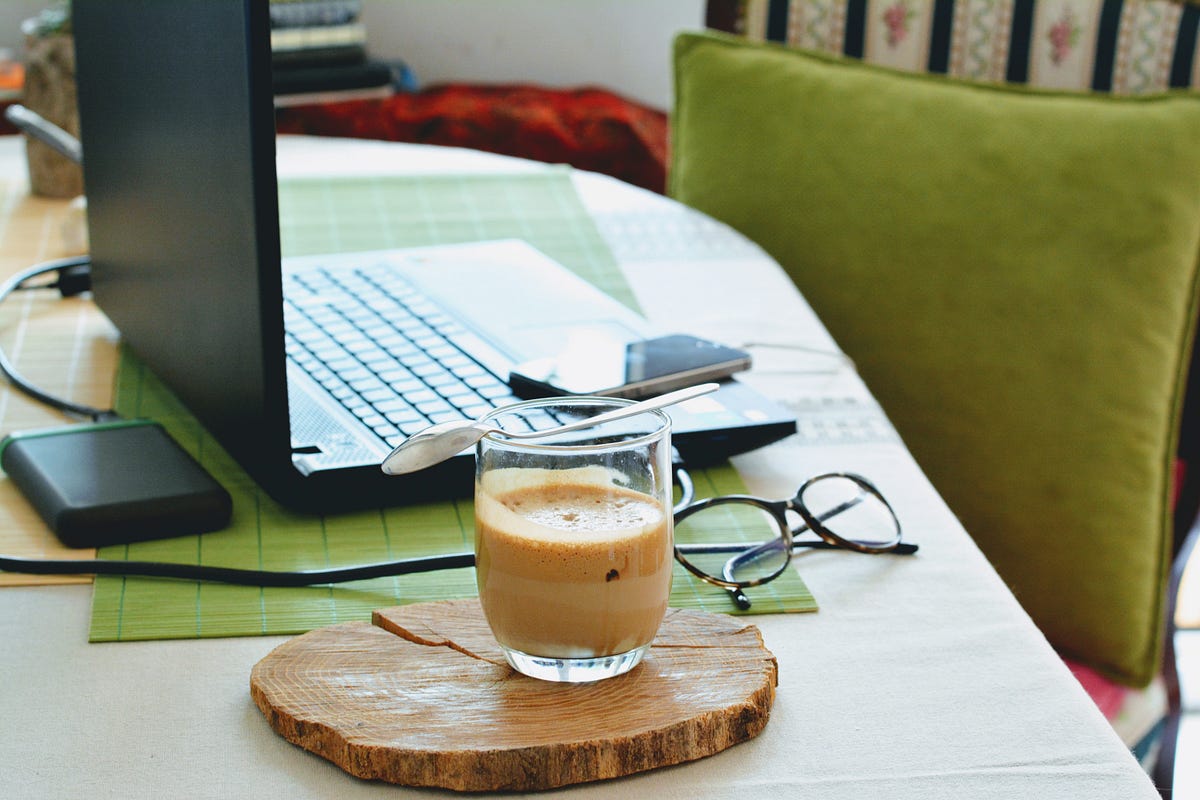
These are just a few tips from our team to support an effective transition to working at home. For more detailed guidance, check out these other helpful resources from ZDNET, Forbes, and Harvard Business Review.
Do you have any other tips or resources? Share them in the comments below to help other members in this community throughout this crisis.
More from e-Residency
- Sign up for our newsletter
- Watch fresh video content - subscribe to our Youtube channel
- Meet our team and e-residents - register for our next Live Q&A
